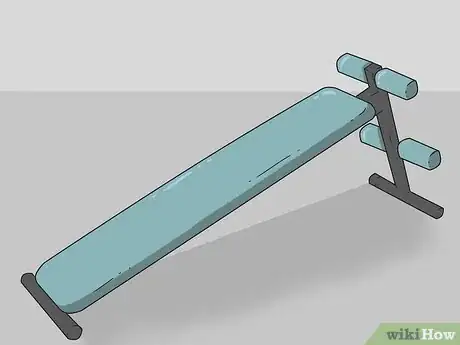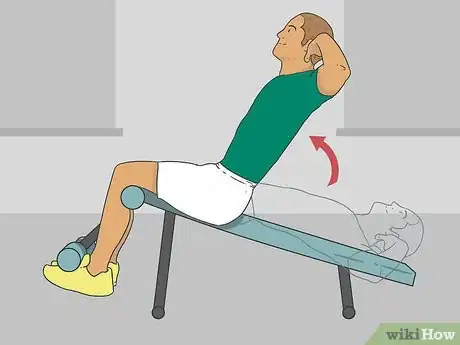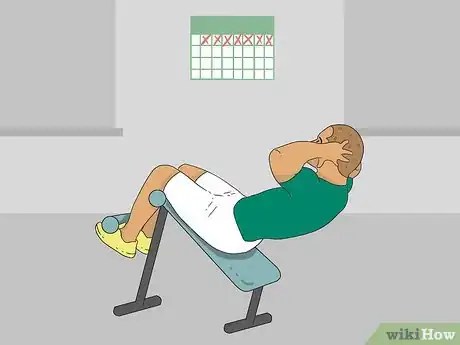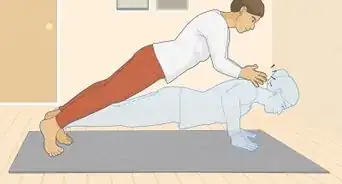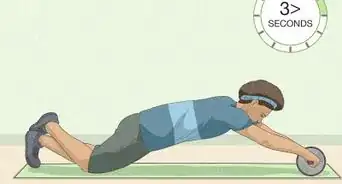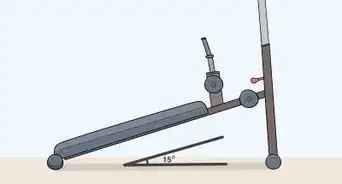This article was co-authored by Tiffany Stafford, CPT and by wikiHow staff writer, Sophia Latorre. Tiffany Stafford is a Certified Personal Trainer, Holistic Nutritionist, and the Owner of LifeBODY Fitness, a personal training and small group training studio based in Hillsboro, Oregon. She has over 15 years of personal training and coaching experience. She specializes in wellness training, life coaching, and holistic nutrition teaching. She earned her personal training certification from the National Academy of Sports Medicine (NASM).
This article has been viewed 119,473 times.
If you’re looking to build core strength, sit ups can be a useful exercise as they increase strength and flexibility in your abdominal muscles. Doing sit ups on an incline bench are more effective than regular sit ups, as there is a wider range of motion. This exercise strengthens your rectus abdominis, or your "six-pack muscle." You can even add weights or adjust the incline for an additional challenge.
Steps
Getting in the Starting Position
-
1Find an incline bench. This exercise will work best if you have a support bar, or foot brace, under which to hook your feet as well.
-
2Set the decline angle. You should start with an angle between 30 and 45 degrees. The higher the angle, the harder the sit ups will be.[1]Advertisement
-
3Sit on the bench with your knees bent. Your feet should be on the inclined (higher) side of the bench and your head should be at the declined (lower) side of the bench. Hook your legs under the foot brace or support bar.
-
4Lie down so that your upper body is declined. Cup your hands over your ears or hold the tips of your ears with your fingertips. Avoid placing your hands behind your neck, as this can lead to injury when the head and neck are pushed too far forward.[2]
Performing the Exercise
-
1Raise yourself from the bench by bending your waist and hips. Make sure your abs stay tightened and your back is straight. You should raise up until your upper body is completely vertical.[3]
-
2Lower yourself down slowly. You should slowly lower your body until the back of your shoulders touch the bench. Keep your back straight and your abs tight.[4]
-
3Repeat for the desired number of repetitions. Try to do 10 repetitions of this exercise per set. Repeat until you've completed 3 sets.[5]
Challenging Yourself
-
1Increase the incline. Increasing the incline makes the exercise more challenging. If you’ve got the hang of this exercise and want to challenge yourself, increase the incline by 5-10 degrees.[6]
- The bench will have a knob which allows you to lift and position the high end of the bench even higher.
-
2
-
3Increase the frequency. If you start out doing this exercise once or twice per week, increase that to three to four times per week. The more sit ups you do, the better results you will see.[9]
Expert Q&A
Did you know you can get expert answers for this article?
Unlock expert answers by supporting wikiHow
-
QuestionIs doing sit ups good for you?
 Michele DolanMichele Dolan is a BCRPA certified Personal Trainer in British Columbia. She has been a personal trainer and fitness instructor since 2002.
Michele DolanMichele Dolan is a BCRPA certified Personal Trainer in British Columbia. She has been a personal trainer and fitness instructor since 2002.
Certified Fitness Trainer
-
QuestionWhat is a decline sit up?
 Michele DolanMichele Dolan is a BCRPA certified Personal Trainer in British Columbia. She has been a personal trainer and fitness instructor since 2002.
Michele DolanMichele Dolan is a BCRPA certified Personal Trainer in British Columbia. She has been a personal trainer and fitness instructor since 2002.
Certified Fitness Trainer
-
QuestionHow do you do a decline crunch?
 Michele DolanMichele Dolan is a BCRPA certified Personal Trainer in British Columbia. She has been a personal trainer and fitness instructor since 2002.
Michele DolanMichele Dolan is a BCRPA certified Personal Trainer in British Columbia. She has been a personal trainer and fitness instructor since 2002.
Certified Fitness Trainer
Warnings
- Limit the number of sets and repetitions you perform of this exercise, as this movement pattern is attributed to lower back injuries.⧼thumbs_response⧽
- Potential injuries to your back and neck may be incurred if this exercise is performed incorrectly.⧼thumbs_response⧽
- Abdominal exercises should always be matched with exercises for the spinal erector muscles in the back, so do moves like the Superman in conjunction with inclined sit ups.⧼thumbs_response⧽
Things You Need
- Incline board with foot brace
- Weight plate
References
- ↑ https://www.muscleandstrength.com/exercises/decline-situp.html
- ↑ http://www.exrx.net/WeightExercises/RectusAbdominis/WtInclineSitUpX.html
- ↑ http://www.exrx.net/WeightExercises/RectusAbdominis/WtInclineSitUpX.html
- ↑ http://www.exrx.net/WeightExercises/RectusAbdominis/WtInclineSitUpX.html
- ↑ https://www.muscleandstrength.com/exercises/decline-situp.html
- ↑ https://www.muscleandstrength.com/exercises/decline-situp.html
- ↑ Tiffany Stafford, CPT. Life Coach, Personal Trainer, & Holistic Nutritionist. Expert Interview. 26 March 2020.
- ↑ http://www.exrx.net/WeightExercises/RectusAbdominis/WtInclineSitUpX.html
- ↑ http://www.exrx.net/WeightExercises/RectusAbdominis/BWInclineSitUp.html
About This Article
Doing inclined sit-ups is a great way to build core strength and increase your flexibility. To do inclined sit-ups, you’ll need an incline bench and some weights if you want an extra challenge. If you’re just starting off, set your bench at a 30-45 degree angle. Sit on the bench with your knees bent and your feet tucked under the foot brace. Lie down, then raise yourself to a sitting position while flexing your abs and keeping your back straight. Try to do 3 sets of 10 repetitions each. Once you get stronger, you can increase the angle of your bench by 5-10 degrees. You can also hold a weight against your chest for an extra workout. To learn how to adjust your incline bench, read more from our Training co-author!
